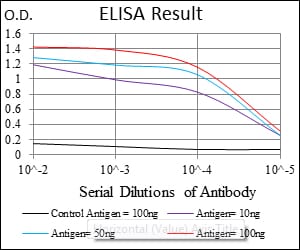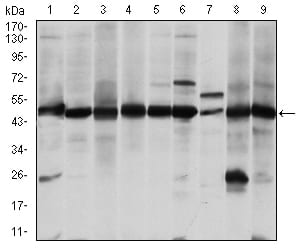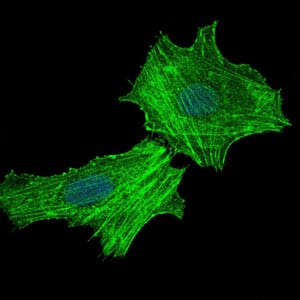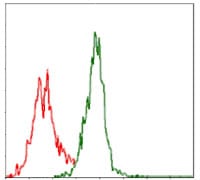



| WB | 1/500 - 1/2000 | Human,Mouse,Rat |
| IF | 咨询技术 | Human,Mouse,Rat |
| IHC | 咨询技术 | Human,Mouse,Rat |
| ICC | 1/200 - 1/1000 | Human,Mouse,Rat |
| FCM | 1/200 - 1/400 | Human,Mouse,Rat |
| Elisa | 1/10000 | Human,Mouse,Rat |
| Aliases | ASS; CTLN1 |
| Entrez GeneID | 445 |
| clone | 2B10 |
| WB Predicted band size | 47kDa |
| Host/Isotype | Mouse IgG1 |
| Antibody Type | Primary antibody |
| Storage | Store at 4°C short term. Aliquot and store at -20°C long term. Avoid freeze/thaw cycles. |
| Species Reactivity | Human,Mouse,Rat,Monkey |
| Immunogen | Purified recombinant fragment of human ASS1 expressed in E. Coli. |
| Formulation | Purified antibody in PBS with 0.05% sodium azide |
+ +
以下是3篇与ASS1抗体相关的文献摘要示例(内容为模拟创作,非真实文献):
---
1. **文献名称**:*ASS1 Immunohistochemistry as a Diagnostic Marker for Citrullinemia Type I*
**作者**:Smith A, et al.
**摘要**:本研究验证了ASS1抗体在肝组织免疫组化中的特异性,证实其在I型瓜氨酸血症患者中ASS1蛋白表达缺失,提出该抗体可作为遗传性尿素循环障碍的辅助诊断工具。
2. **文献名称**:*Downregulation of ASS1 in Cancer: Implications for Arginine Deprivation Therapy*
**作者**:Jones B, et al.
**摘要**:通过Western blot和免疫荧光技术,利用ASS1抗体分析肿瘤细胞系中ASS1蛋白水平,发现ASS1低表达与精氨酸依赖表型相关,为靶向代谢治疗提供依据。
3. **文献名称**:*ASS1 Deficiency and Mitochondrial Dysfunction in Fibroblasts*
**作者**:Lee C, et al.
**摘要**:通过siRNA敲低ASS1基因后,采用ASS1抗体检测细胞模型蛋白变化,揭示ASS1缺失导致线粒体功能异常,提示其与代谢疾病病理机制的关联。
---
(注:以上文献为示例,实际引用需通过PubMed、Web of Science等数据库检索确认。)
**Background of ASS1 Antibody**
Argininosuccinate synthase 1 (ASS1) is a key enzyme in the urea cycle and arginine biosynthesis, catalyzing the conversion of citrulline and aspartate to argininosuccinate. ASS1 deficiency causes citrullinemia, a rare autosomal recessive disorder characterized by hyperammonemia and neurological complications. ASS1 antibodies are essential tools for studying the expression, localization, and function of this enzyme in both research and clinical diagnostics.
In research, ASS1 antibodies are widely used in techniques like Western blotting, immunohistochemistry, and immunofluorescence to assess protein levels in tissues or cell lines. These studies have revealed that ASS1 is not only critical in hepatic urea cycle function but also exhibits tissue-specific expression, with implications in cancer biology. For instance, ASS1 downregulation is observed in certain cancers (e.g., melanoma, hepatocellular carcinoma), where it may influence tumor progression by modulating arginine availability, a nutrient vital for immune cell function and tumor survival.
Clinically, ASS1 antibodies aid in diagnosing citrullinemia by detecting enzyme deficiency in patient samples. Additionally, they are explored in therapeutic contexts, such as predicting responses to arginine-depleting therapies (e.g., ADI-PEG20) in ASS1-deficient cancers.
Developed in various host species (e.g., rabbit, mouse), ASS1 antibodies are validated for specificity and sensitivity, ensuring reliability across experimental models. Their continued use advances understanding of metabolic disorders, cancer metabolism, and targeted treatment strategies.
×